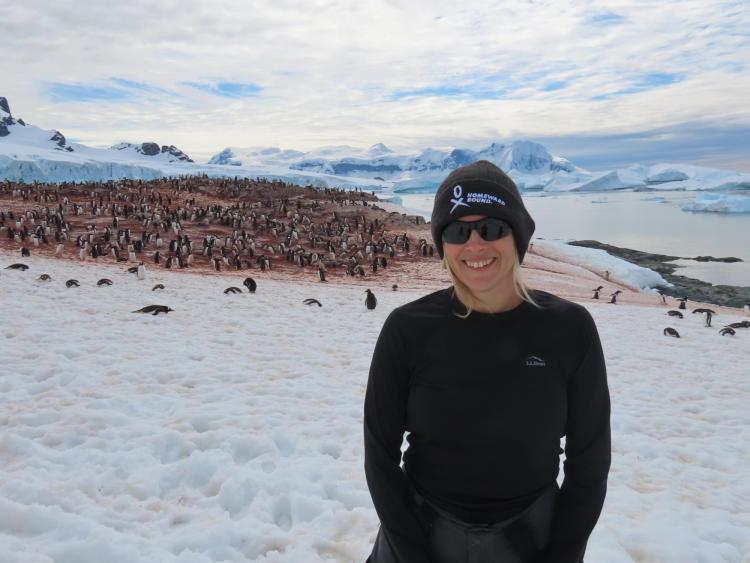As Earth's atmosphere continues to warm, biodiversity in the global ocean is increasingly at risk. Previous studies have shown the Southern Ocean has absorbed the vast majority of excess heat and emissions to slow the effects of climate change. But that absorption comes at a cost.
Later this month, representatives from 27 nations representing the Commission for the Conservation of Antarctic Marine Living Resources (CCAMLR) will meet in Santiago, Chile to try and establish additional marine protected areas (MPAs) in the Southern Ocean. Cassandra Brooks, an assistant professor in Environmental Studies, will be in attendance.
Brooks has spent the last 20 years working and researching ways to understand and advance marine conservation across the globe, with a focus on Antarctica. She sat down with CU Boulder Today to explain the importance of protecting the Southern Ocean in particular as the world races to conserve biodiversity across the globe.
Why are oceans so important?
Increasing research suggests that our health, livelihood and literal survival depends on a healthy ocean. There's a fun statistic that every other breath you take comes from phytoplankton in the ocean. Not only that, there's increasing evidence that the ocean regulates the climate. It drives global ocean circulation and is critical to the functioning of entire earth systems. It's also a major food source: Our food for up to 2 billion people comes from the ocean.
What role does the Southern Ocean play in the global ecosystem?
The Southern Ocean surrounds Antarctica, and it makes up about 10% of the global ocean. Of all the oceans, some might argue that the Southern Ocean is potentially the most important at regulating the climate. It's been storing heat and carbon--and because it's been storing so much, it's warming.
Antarctica also stores freshwater in the form of ice, so it drives global ocean circulation. All of this makes the Southern Ocean a critically important area that is increasingly under stress from climate change and also from commercial fishing, of which has been increasingly of interest in recent years.
How are these stressors impacting life there?

Cassandra Brooks in Antarctica. (Credit: Cassandra Brooks)

Two seals laying near a muddy shoreline in Antarctica. (Credit: Cassandra Brooks)
Antarctica as a continent is the coldest, windiest, driest place on earth, and the waters around it are incredibly harsh. The animals living in the waters around Antarctica are superbly adapted to this frozen environment that also receives no sunlight for half the year. For example, some of the fish that live there actually don't have red blood cells, they've evolved to just have white blood cells.
This is why warming, as you can imagine, is so detrimental. These dramatic changes in the environment are causing changes throughout the ecosystem.
Let's get to the upcoming CCAMLR meeting. What's it about?
The Commission is an international body that has the power to actually designate marine protected areas (MPAs) in the Southern Ocean, and international marine conservation is incredibly difficult to get countries to get on the same page about. The meeting in Chile matters in a global context because there are three different large scale marine protected areas under negotiation, and if we adopt them, it actually would move global targets forward.
The CCAMLR has been considered potentially a leader in doing so because it already has a track record of designating marine protected areas, first in 2009, and again in 2016 with the adoption of the Ross Sea Region MPA--the largest in the world.
What's at stake this time?
You may have heard of the global target of "30x30." Its goal is to protect 30% of the land and oceans by 2030. All countries have agreed to this through a global biodiversity framework that was adopted last December.
Currently, 8% of our global oceans are protected. These negotiations could bump that up to 9%, and increase protection of the Southern Ocean from 12% to 22%. This work gets us closer to that 30x30 target and closer to protecting the vulnerable biodiversity in the Southern Ocean.
What else makes the Southern Ocean unique?
There are very few places left in the world where we can study healthy marine ecosystems. Antarctica is one of those places where we can understand climate change impacts: Historically, at least the high latitude regions closest to the continent have been relatively free from the types of human threats seen in the rest of the world. The Ross Sea MPA, for example, was so important to protect because it was one of the places left in the world that didn't have invasive species or mining, and while it had it had some fishing, it wasn't at the scale that the rest of the world has experienced.
Another amazing thing about the Southern Ocean in particular is that we've had international scientific collaborations there for over 100 years. Countries will work side by side even if they're diplomatically fighting.
What's the important takeaway from this?
There is always hope! If we give up and we say the challenges are too big, climate change has gone too far and we can't recover, then then we never will. But if we demand a different future, demand policy change and we demand our governments do more to protect the oceans, then then things can change.






